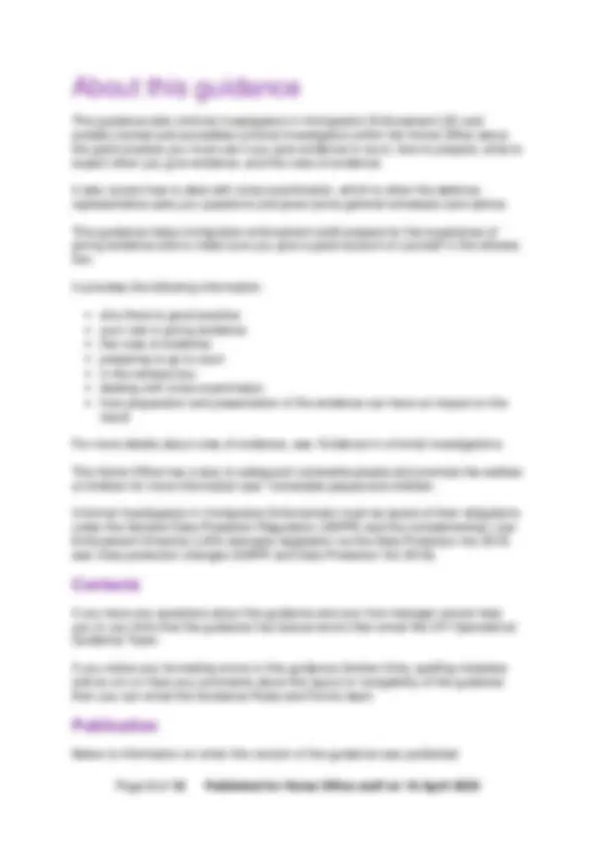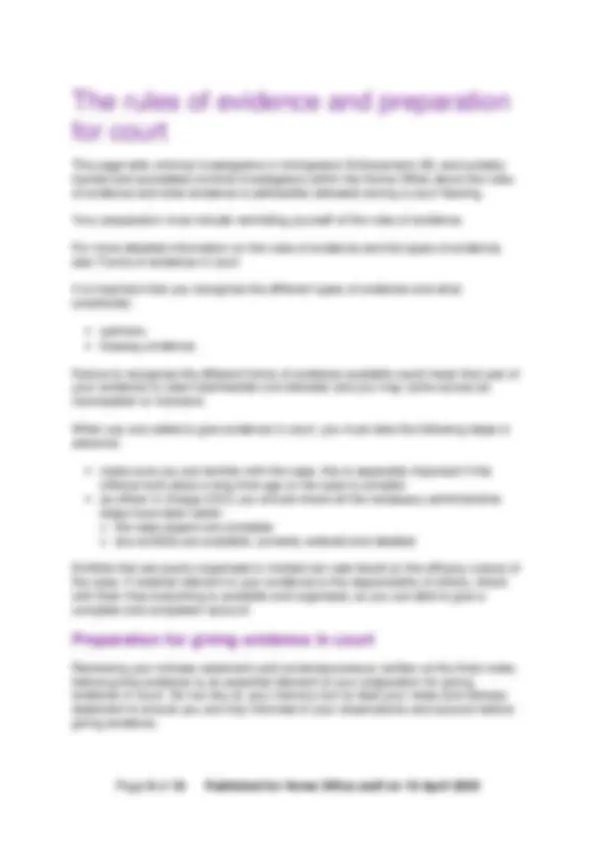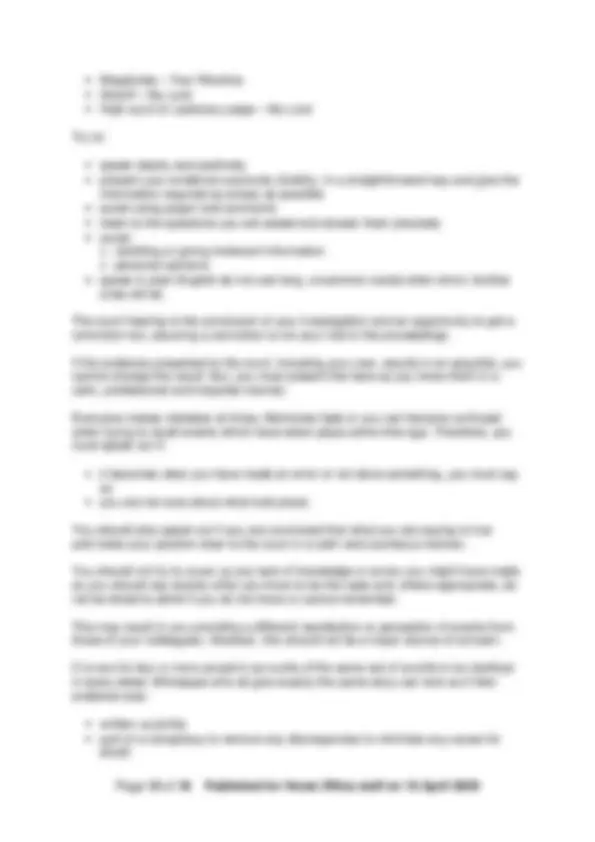Download Giving Evidence in Court: A Guide for Home Office Staff and more Study notes Criminal Justice in PDF only on Docsity!
Giving evidence in court
Version 5.
Contents
- Contents
- About this guidance
- Contacts
- Publication
- Changes from last version of this guidance
- Giving evidence in court: good practice......................................................................
- How to prepare before going to court
- The responsibilities of an officer in charge (OIC) giving evidence at court
- Pre-trial visit
- The rules of evidence and preparation for court
- Preparation for giving evidence in court..................................................................
- Disclosure and evidence
- Dealing with cross examination
- version 5.
- published for Home Office staff on 16 April 2 020
Changes from last version of this guidance
Minor housekeeping Related content Contents
Giving evidence in court: good practice
This page tells criminal investigators in Immigration Enforcement (IE) and suitably trained and accredited criminal investigators within the Home Office about good practice when giving evidence in court. Going to court to give evidence can be a nerve-racking experience. The evidence you give and the way you give it are important factors in the decision-making process for both:
- major cases
- cases involving relatively minor offences Your evidence can be crucial to the outcome of a trial, and the public do not take it for granted that your evidence is completely truthful or credible. All staff are under the same pressure as any other witness to demonstrate their:
- honesty
- credibility
- competence It is important to maintain and improve public confidence in the criminal justice system and immigration enforcement. If you are called to give evidence in court you must expect to go through rigorous questioning from the defence and, in some instances, your integrity may be questioned. Complex or hostile questioning from the defence or allegations of impropriety (improper behaviour) can make you feel that either you or the organisation is on trial rather than the defendant. If you do not prepare your case correctly or detail the facts properly you can do a disservice to yourself, the organisation and to the cause of justice. If you need more information about giving evidence in court, see: CPS: Going to court Related content
Contents
How to prepare before going to court
This page tells criminal investigators in Immigration Enforcement (IE) and suitably trained and accredited criminal investigators within the Home Office about how to
How to prepare before going to court
The key to a good presentation of evidence is preparation. You must consider the whole process not just the time spent in the witness box. You must also remember that everything you do, say or record as having seen or heard, from the first report or observation of an offence throughout the course of the investigation and those things you fail to do or record may be subject to the critical scrutiny of the court.
The responsibilities of an officer in charge (OIC) giving
evidence at court
To help you present your evidence and to respond to questions about your evidence, you must take care to make sure your notes and other records are accurate and clear. It gives a poor impression to the court if your exhibits are mishandled or mislaid, so you must organise the exhibits beforehand, especially if there is a large number. Any doubts, apparent inefficiency or lack of knowledge of the case can detract from the prosecution case. Equally, if you do not have the required information it can damage you personally and the organisation or could have serious implications for the defendant.
Pre-trial visit
Courts can be confusing and sometimes intimidating places so try and arrange a pre- court visit so the first time you give evidence is not your first time in court. Spending time in both a magistrates’ and a Crown court, (or Sheriff Court and High court of Justiciary in Scotland) to familiarise yourself with the surroundings and court procedures will help you to understand:
- how a hearing is conducted
- the roles of those present
- the ways in which people should behave Court observation makes the court a more familiar and less intimidating place when you have to give your evidence. Seeing the formality of the surroundings and seriousness of the issues the courts deal with helps you to understand the significance of your role in presenting evidence. For more information about evidence in criminal investigation, see: Evidence in criminal investigations
Related content Contents
You must not discuss your evidence or compare your witness statement with other officers involved in the case. If you are found to have done so this will undermine your evidence and could therefore undermine the case itself.
Disclosure and evidence
Under the Criminal Procedure and Investigations Act 1996 (CPIA) or Criminal Justice and Licensing (Scotland) Act 2010 in Scotland you must retain (keep) all material, whether it is information or objects, which is obtained or produced during a criminal investigation, which may be relevant to the investigation. If it is important to the offence under investigation, it will be produced as evidence and later served upon the court and the defendant as evidence (subject to the restrictions regarding sensitive material). For more detailed information on the acceptable types of material and the disclosure process, see:
- CPS: Disclosure
- Criminal procedure and investigation act 1996 (CPIA)
- Criminal Justice and Licensing (Scotland) Act 2010 Related content Contents
Arriving at court
This page tells criminal investigators in Immigration Enforcement (IE) and suitably trained and accredited criminal investigators within the Home Office about arriving at court and how to give evidence in the witness box. Make sure you arrive at court in advance of the time your case is listed so that you have an opportunity to talk to the prosecution lawyer and/or the prosecution barrister or advocate depute before the hearing to:
- make sure they know who you are
- discuss any concerns or outstanding points
- answer any questions you may have before you enter the witness box Occasionally, the prosecution lawyers may not arrive until the hearing commences. However, by talking through issues with prosecution lawyers before you go into the witness box, this will enable you to clarify any problems before you give your evidence. A witness is a person who gives evidence in court, and are either:
- prosecution witnesses who give evidence on behalf of the prosecution case who have instigated (started) the court proceedings
- defence witnesses who give evidence on behalf of the defendant who has had the court proceedings brought against them Before you are required to give your evidence, you will have made a witness statement in relation to your evidence. A witness statement is the main way of informing lawyers about the evidence you can give. The witness statement is recorded on a form MG11 or national standard witness form in Scotland. For more information about making and taking a witness statement and MG forms, see: Witness statements Related content Contents
- Magistrate – Your Worship
- Sheriff – My Lord
- High court of Justiciary judge – My Lord Try to:
- speak clearly and positively
- present your evidence succinctly (briefly), in a straightforward way and give the information required as simply as possible
- avoid using jargon and acronyms
- listen to the questions you are asked and answer them precisely
- avoid: o rambling or giving irrelevant information o personal opinions
- speak in plain English do not use long, uncommon words when short, familiar ones will do The court hearing is the conclusion of your investigation and an opportunity to get a conviction but, securing a conviction is not your role in the proceedings. If the evidence presented to the court, including your own, results in an acquittal, you cannot change the result. But, you must present the facts as you know them in a calm, professional and impartial manner. Everyone makes mistakes at times. Memories fade or you can become confused when trying to recall events which have taken place some time ago. Therefore, you must speak out if;
- it becomes clear you have made an error or not done something, you must say so
- you are not sure about what took place You should also speak out if you are convinced that what you are saying is true and make your position clear to the court in a calm and courteous manner. You should not try to cover up any lack of knowledge or errors you might have made so you should say exactly what you know to be the case and, where appropriate, do not be afraid to admit if you do not know or cannot remember. This may result in you providing a different recollection or perception of events from those of your colleagues. However, this should not be a major source of concern. It is rare for two or more people’s accounts of the same set of events to be identical in every detail. Witnesses who all give exactly the same story can look as if their evidence was:
- written up jointly
- part of a conspiracy to remove any discrepancies to minimise any cause for doubt
Stick to the facts and do not be tempted to reconstruct what you do not know. Normally, when you have entered the witness box and taken the oath you are expected to give all your evidence before leaving the witness box. But there may be occasions when giving evidence spans a break in the court hearing. This is called part heard. This break may be:
- a short recess
- a meal break
- an overnight adjournment
- exceptionally, for the court to hear the evidence of other witnesses whilst another remains part heard During the period of any break in your evidence you must not discuss the case or your evidence with anyone else. To avoid any accusation that you have discussed your evidence with others if you are part heard you must wherever possible not associate with colleagues unless it is unavoidable. For example, travelling home in a shared vehicle with other witnesses. If this situation occurs you must make:
- this status known to colleagues
- sure the case is not discussed in your presence or hearing Related content Contents
- vehicle registration marks Related content Contents
Dealing with cross examination
This page tells criminal investigators in Immigration Enforcement (IE) and suitably trained and accredited criminal investigators within the Home Office how to deal with cross examination by defence representatives. You may find the prospect of cross examination by the defence particularly daunting. However, in practice it should not be a problem, if:
- you are well prepared and confident
- the investigation stands up to scrutiny
- you do not attempt to answer questions beyond your level of knowledge or powers of recall Cross examination can be very demanding, and it helps to anticipate the kinds of questions the defence might ask, to try to:
- identify weaknesses in your account
- cast doubt on the veracity (accuracy) of your evidence
- question the efficiency, fairness or thoroughness of the investigation Listen carefully to the questions you are asked and think before you answer. If you do not understand a question, say so and ask, politely, for clarification. Of course, you must be aware that some defence lawyers will sometimes try to discredit your evidence by:
- pointing out supposed inconsistencies
- challenging you to remember difficult or barely relevant details Do not take defence attacks on your integrity personally, you can only deal with these assertions effectively by remaining calm. Respond calmly and courteously. Do not become:
- emotional
- impatient
- aggressive As a general rule, the person who remains reasonable and composed is more likely to be considered credible by the court. Related content Contents




























